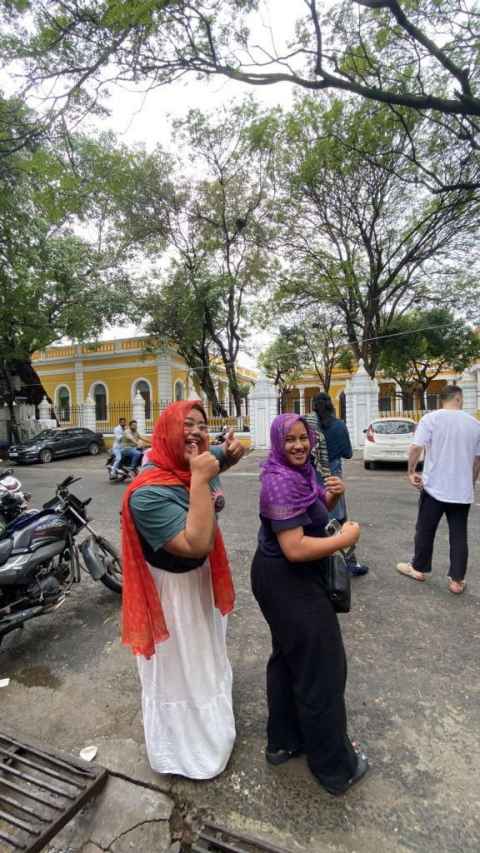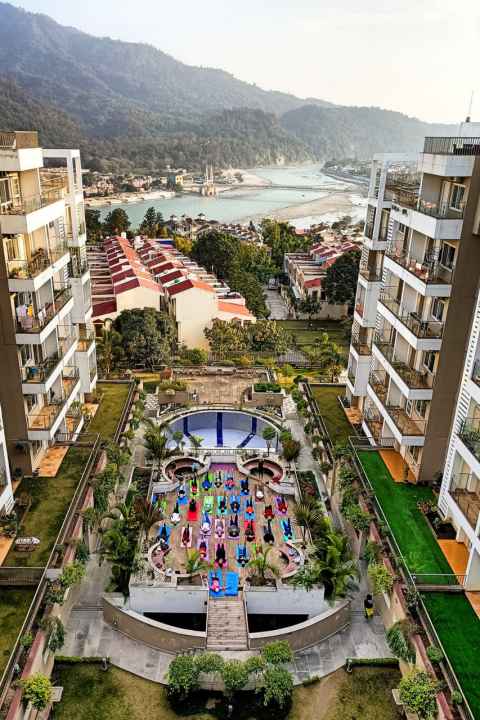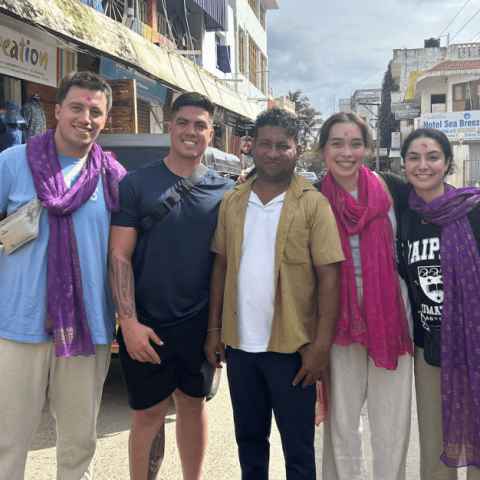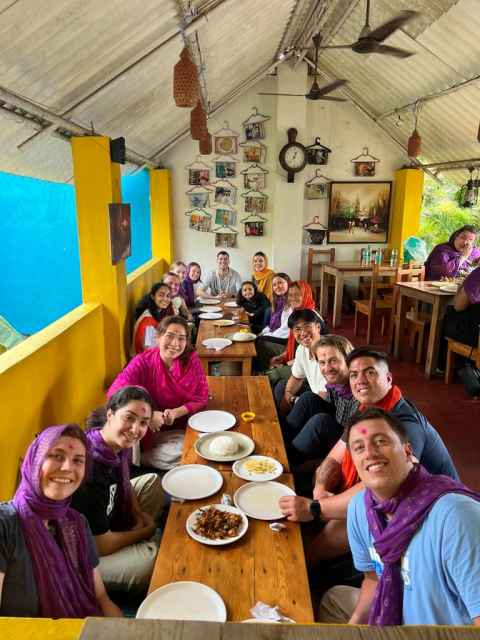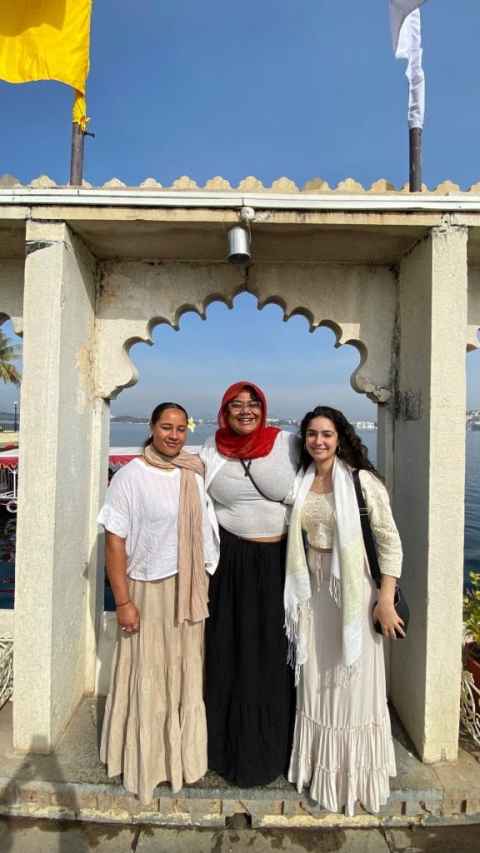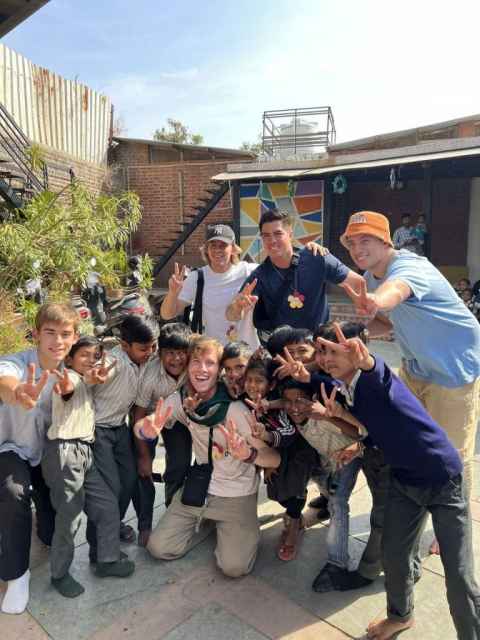New Zealand students reimagine India
Twenty-four students from across four New Zealand institutions spent six weeks in India between January and February 2024, examining life there, creating bonds that transcend borders, and engaging in a life-changing experience.
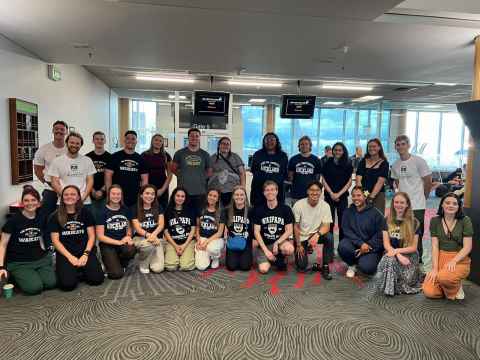
Eleven University of Auckland students served as cultural ambassadors to India recently, as part of Reimagining India, a six-week Prime Minister’s Scholarship for Asia (PMSA) programme, which is funded by the New Zealand Government and administered by Manapou ki te Ao - Education New Zealand.
The participants joined 13 other students – seven from Victoria University of Wellington, five from the University of Waikato and one from Massey University – in cultural exchange, learning of the social, political and economic drivers that power one of Asia’s most populous countries, and sharing the values that define a diverse Aotearoa New Zealand.
In total, the scholars visited 13 cities, from southern to northern India, including Chennai, Puducherry, Auroville, Coimbatore, Mysuru, Bengaluru, Hampi, Mumbai, Ahmedabad, Udaipur, Jaipur, Delhi and Rishikesh. The breadth of exploration revealed the diverse cultures, languages, customs and vocations that comprise the vibrant tapestry of Indian life; this, in turn, provided the programme’s cohort ample opportunities to witness the lives of others – their spiritual commitments, their struggles, their solutions – through their lenses as students, in pursuit of their own professional path. Under the care of the universities’ trusted programme partner, IndoGenius, they visited four universities, six NGOs, nine corporations, and five schools, among other locales, across nine Indian states.
This year’s PMSA cohort followed in the footsteps of two previous cohorts in 2019 and 2023, all of which have been led and organised by the 360 International team, in collaboration with our joint NZ university partners. The 11 participants who represented the University of Auckland included: Mira Askari, Jack Budge, Emalee Doake, Kiri Lea’aetoa, Oscar Lin, Blair McIntosh, Adela Plakic, Charlotte Print, Gena Shimoda, Nadia Snegirev, and Tiana Willis-Baker.
The overseas experience precipitated many moments of newfound insight. Shimoda, a student pursuing a Bachelor of Laws and Bachelor of Arts, said: “The programme was successful in highlighting India's relevance to my studies and/or career. Diplomats require an understanding of a country's context; cultural, economic, and social. Through experiencing so many facets of Indian life, such as temples, start-ups, universities, and social enterprises, I feel I have gained a strong awareness of India.”
“The programme was successful in highlighting India's relevance to my studies and/or career. Diplomats require an understanding of a country's context; cultural, economic, and social. Through experiencing so many facets of Indian life, such as temples, start-ups, universities, and social enterprises, I feel I have gained a strong awareness of India.”
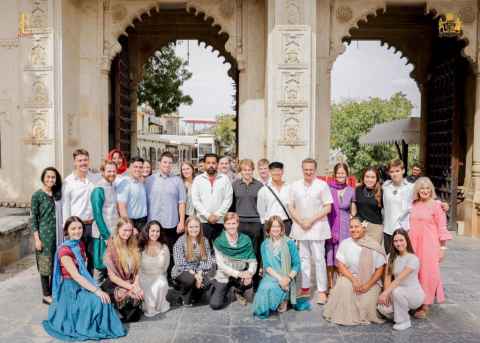
Diplomacy may be a clear career path for such intercultural engagement. But students studying other disciplines gained insights too:
“Quite a simple but effective example (of finding connections between New Zealand and India and the trip’s relevance to my career) was travelling through India by bus,” said Aria Ngarimu, a Victoria University of Wellington student. “I am interested in Urban Planning and have aspirations to go on to study planning at a post-graduate level. Simply driving through India allowed me to see how people interacted with and utilised the environment around them.”
A universal framework for better understanding difference came in the form of
critically observing and analysing community.
“As a Pacific person, this concept deeply resonated with me,” Auckland’s Tiana Willis-Baker said. “In my own cultural context, community is paramount, and seeing how India emphasises communal values such as cooperation, solidarity, and mutual support reinforced my belief in the importance of collective well-being. Understanding this aspect of Indian culture can greatly inform my future career in law, where working within communities and understanding their needs is crucial for effective advocacy and legal representation.”
The scholars also gained new perspectives on Indian values through innovative business practises. Examples of this can be found in students’ visits with Jaipur Foot, an organisation offering free prosthetic limbs to those in need; Mitti Café, dedicated to offering employment to people with disabilities and Licious, a company committed to providing clean, safe meat across India.
“Coming to India as someone who studies population health, I came seeking a greater understanding of other cultural approaches to healthcare, and I never could have imagined how inspired I would become by organisations such as Jaipur Foot,” said Saya Karauna from the University of Waikato. “Jaipur Foot stands out as a beacon of compassionate healthcare innovation. Witnessing firsthand the profound impact of Jaipur Foot’s work in restoring mobility and facilitating societal reintegration has left me feeling beyond inspired.”
The cultural insights acquired through the Reimagining India programme will
ultimately impact New Zealand society and workforce in diverse ways, as the 24 students represent various disciplines, from law, economics, history and psychology to architecture, media/film, population health, international relations and engineering, among others.
Another key objective of the Prime Minister's Scholarship programme includes promoting New Zealand as an education destination. Scholars relished the opportunity to speak about their lives as students in Aotearoa.
“We visited students across India in Ahmedabad, Bangalore, and Delhi where we were asked questions about student life back at our home institutions,” Shimoda said. “Indian students often were curious about the subjects they could study, the structure of degrees, and the extracurricular activities available. I was always happy to answer these questions and encouraged the students to look into study-abroad opportunities in New Zealand.”
Some students indicated that showcasing education happened indirectly – less in a promotional or recruitment capacity – and more as living representations of the values inherent in higher education.
“While there were less conversations specifically on what we studied, and the education system of New Zealand, the broad range of educational expertise in the group wasn’t lost to our Indian hosts,” UoA student Oscar Lin said. “This expertise came out in analytical discussions and thoughtful questions of all kinds.”
Adela Plakic, also a UoA student, echoed his sentiments:
“…Beyond visible expressions of culture, what truly stood out was our approach as students,” she said. “Our willingness to listen, be respectful, love, and practise reciprocity showed for our hosts were fundamental in facilitating cultural exchange. Our genuine curiosity, manifested through the questions we asked and the eagerness to learn about Indian culture, contributed significantly to creating a welcoming and open-minded representation of New Zealand.”
The Prime Minister’s Scholarship Programme aims to achieve national objectives, as set out by the government’s International Education Strategy 2022-2030 – to develop global citizens; and the MFAT 2025 strategy –"to advance mutual trust and broaden cultural connections between India and New Zealand, among others.”
These opportunities also allow students to expand their networks across the region, and by extension, strengthen institutional and national ties, contributing to the aims of Taumata Teitei in ensuring that Waipapa Taumata Rau - The University of Auckland is globally networked and connected and providing graduates with the skills and experience to make the world better tomorrow than it is today.
To read more about the 2024 PMSA Reimagining India programme, visit the students’ blog posts here. You can also watch the short film created by Oscar Lin following is participation in the programme.
360 International Outbound Scholarships Coordinator
Bobbie Noloboff
E: bobbie.noloboff@auckland.ac.nz
